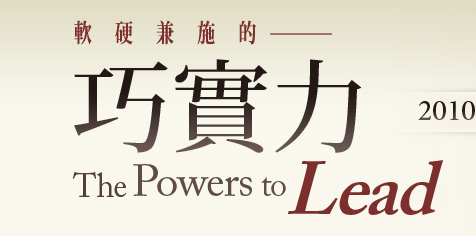 |
 |
| |
奈伊教授是少數在美國學界備受尊崇,兼具在美國政府單位有實際行政經驗的意見領袖。
奈伊教授大學畢業於普林斯頓大學,於哈佛大學取得博士學位,1964年起即在哈佛大學任教。在公共行政領域享譽國際的哈佛大學甘迺迪政府學院(the John F. Kennedy School of Government),曾經聘任奈伊教授擔任過10年(1995~2004)的院長職務。
由於其傑出的學術成就和行政能力,奈伊教授目前是哈佛大學校聘傑出教授(University Distinguished Service Professor),持續於甘迺迪政府學院任教。
不同於一般學者在學校中埋首研究,奈伊教授在過去三十年間,曾多次被美國政府予以重任。他曾擔任負責美國國際安全事務的助理國防部長、美國國家情報委員會主席以及主管安全協助、科學與科技的副國務次卿。2005年,更被票選為美國十大最有影響力的國際關係學者之一。
|
|
 |
|
 |
| |
Professor Joseph Nye coined the phrase “soft power” in his book, Bound to Lead: the Changing Nature of American Power in 1990. He further developed the concept in his 2004 book, Soft Power: the Means to Success in World Politics. He believes that it is soft power that will help prevent terrorists from recruiting supporters from among the moderate majority. And it is soft power that will help us deal with critical global issues that require multilateral cooperation among states. The term is now widely used in international affairs by political leaders, statesmen, analysts, editorial writers, and academics around the world. In 2008, Nye applied the concepts of hard and soft power to individual leadership in The Powers to Lead.
Joseph Nye received his bachelor’s degree from Princeton University and did postgraduate work at Oxford University on a Rhodes scholarship. He earned a Ph.D. from Harvard University, and joined the Harvard Faculty in 1964. He served as Dean of the John F. Kennedy School of Government from 1995 through 2004.
Professor Nye has extensive experience working in government agencies. In the past thirty-some years, he has served as Deputy to the Under Secretary of State for Security Assistance, Science and Technology, chairman of National Security Council Group on Nonproliferation of Nuclear Weapons, and chairman of the National Intelligence Council. He’s also served as Assistant Secretary of Defense for International Security Affairs, Assistant Secretary of Defense for International Security Affairs in the Clinton Administration. He is widely recognized as one of the foremost liberal thinkers on foreign policy. In 2005, he was voted one of the ten most influential scholars of international relations in the USA. Nye sits on the Advisory board of many academic institutions of Foreign Policy. He has been awarded the Woodrow Wilson Prize by Princeton University and the Humphrey Prize by the American Political Science Association.
A Fellow of the American Academy of Arts and Sciences and of the Academy of Diplomacy, Professor Nye has served as a director of the Institute for East-West Security Studies, a director of the International Institute for Strategic Studies, a member of the advisory committee of the Institute of International Economics, and the American representative on the United Nations Advisory Committee on Disarmament Affairs.
Professor Nye’s last visit to Taiwan was in 2001.
|
 |
|
| |
|
 |
|


